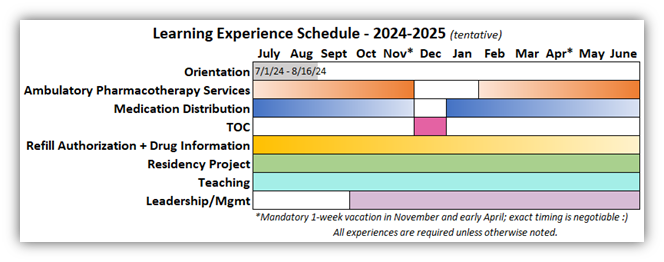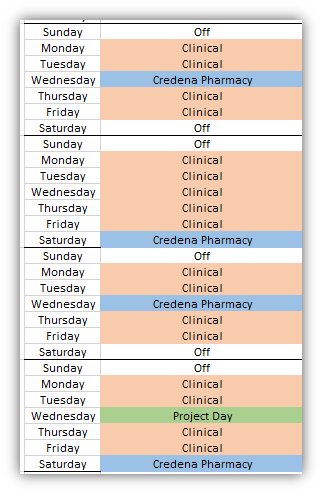What does a “day in the life” of a resident look like?
All required learning experiences are longitudinal, meaning several (most) of them run concurrently. Because of this, residents are tasked with managing their schedule to balance their duties each week, with priority given to patient care activities – a structure/environment that closely mimics post-residency pharmacy practice and builds the important skills of managing both time and multiple responsibilities.

For the 2024-2025 program all required learning experiences (with the exception of Orientation, Leadership/Management, and Transitions of Care (TOC)) last for the full 12 months of the residency.
Based on past resident feedback, we have condensed TOC into a 4-week concentrated/dedicated learning experience and changed the Medication Distribution staffing schedule to allow for more dedicated time in the outpatient pharmacy. Throughout the year the focus on different learning experiences changes to meet the needs and interests of residents (indicated by the shading intensity on the image above). Please see the question “How do you support resident wellness?” below for information regarding paid time off.
A ”typical” week of a resident includes at least 4 days of working in the ambulatory clinic providing direct patient care and working with the primary care clinic team, and 1 day staffing in Credena Health Pharmacy Monroe. Depending on the time of year, additional activities (e.g., volunteering activities, preparing for residency interviews) will be scheduled in addition to (or in place of) regularly scheduled duties. A standard four-week schedule for one resident may look something like this:

What types of residency projects have been done in the past?
Project topics are selected based on the needs of the clinic or the ambulatory pharmacy department, often evaluate a new or current pharmacy service, and are instrumental in ongoing quality improvement for our services. Check out the “Our Residents” page for a list of past residents and their projects.
What types of positions do residents find after completing this residency program?
Our residents are often selected for clinical pharmacy positions after graduating from our program. Check out the “Our Residents” page for a list of past residents and their post-residency positions.
Are there any elective learning experiences?
Over the past several years residents have not chosen to pursue any of our formally offered elective learning experiences because of how robust the required experiences are. Additionally, we have continued to increase the scope of all required learning experiences. For example, we previously had a Medical Literature Evaluation elective learning experience, but felt that this skill is so valuable that it should be incorporated as part of residents’ required experience as part of the residency project. Therefore, based on past resident decisions and feedback, we have made the slightly unconventional decision to no longer provide formal elective learning experiences.
That said, we work with residents to incorporate any personal clinical interests as much as possible into the existing learning experiences, and are happy to set up any shadowing opportunities or informal elective learning experiences with our preceptors whenever possible. Examples of potential informal experiences are complex comprehensive medication reviews, opioid/pain management (including use of buprenorphine products), hepatitis C, and dermatology. Please just ask!
Are there any inpatient or acute care rotations or learning experiences in this residency program?
No. Our program is completely focused on outpatient pharmacy practice.
How do you incorporate resident feedback? Or, what changes have you made to the program based on feedback from residents?
SO many changes! We rely heavily upon (and encourage!) honest feedback from residents to improve our program. Over the years we have changed the order, duration, and content of multiple learning experiences; increased communication between preceptors; and provided an internal SharePoint site for navigating residency-related information. Each year we also allow residents to participate to a high degree in our residency interviews by creating and editing interview content.
Where do the residents practice?
Residents spend the majority of their time practicing at the Providence Medical Building (PMB) in Monroe, Washington, which is located about 30 minutes southeast of Everett. Residents also spend a some time at the Anticoagulation & Medication Clinic (which is an ambulatory clinic) at the Providence Regional Medical Center in Everett during orientation, training, and for one day each week for clinical shifts in the first half of the program.
Do the residents have their own work space or office?
The clinic layout is entirely open-concept, and all caregivers (providers, RNs, pharmacists, social workers, MAs, etc.) have desks in an open common area. Each resident is given a desk within the clinic, immersed with the rest of the healthcare team.
Where do residents usually live?
Monroe is located in western Washington, about 45 minutes northeast of Seattle and less than an hour from the Cascade mountain range. Our residents often live in areas west or southwest of Monroe, in cities such as Woodinville, Lynnwood, Mill Creek, Bothell, and northern Seattle.
How do you support resident wellness?
Mental wellness, avoiding burnout, and general work-life balance are critically important. We want our residents to thrive in our program, and recognize that this is simply not possible without proper wellness and balance. We strongly encourage residents to reach out and be open about what they need and how we can best support them. We like balancing professionalism with a healthy amount of fun.
From a scheduling standpoint, weekend resident staffing in Credena Health Pharmacy Monroe only occurs on Saturdays every other week, to help ensure at least one day off every single week. The ambulatory clinic is closed on weekends. Residents are also provided with scheduled (and paid) time off during the year (7-day pre-planned vacations in November and April, plus time off for sick days, personal appointments, and several holidays). Additionally, residents enjoy a dedicated full project day once every four weeks.
To augment support within the residency program itself, Providence as an organization also provides a number of excellent resources centered on self-care, burnout, self-guided wellness, and mental health support for all of its caregivers.
How many resident positions are available for this program?
Two. Both residents work closely together throughout the 12-month program.
What is the timeline for interviews?
Please see our "How to Apply" page.